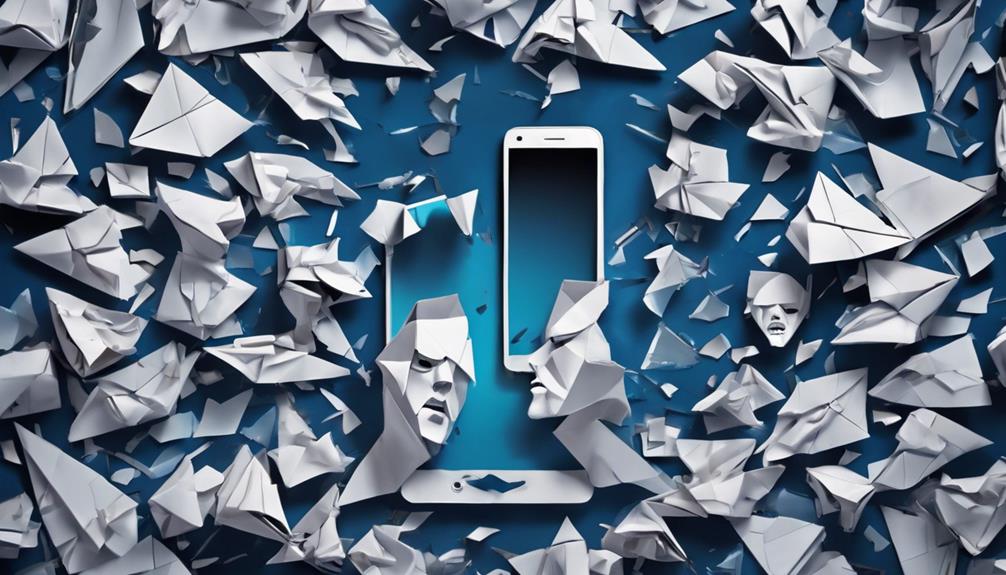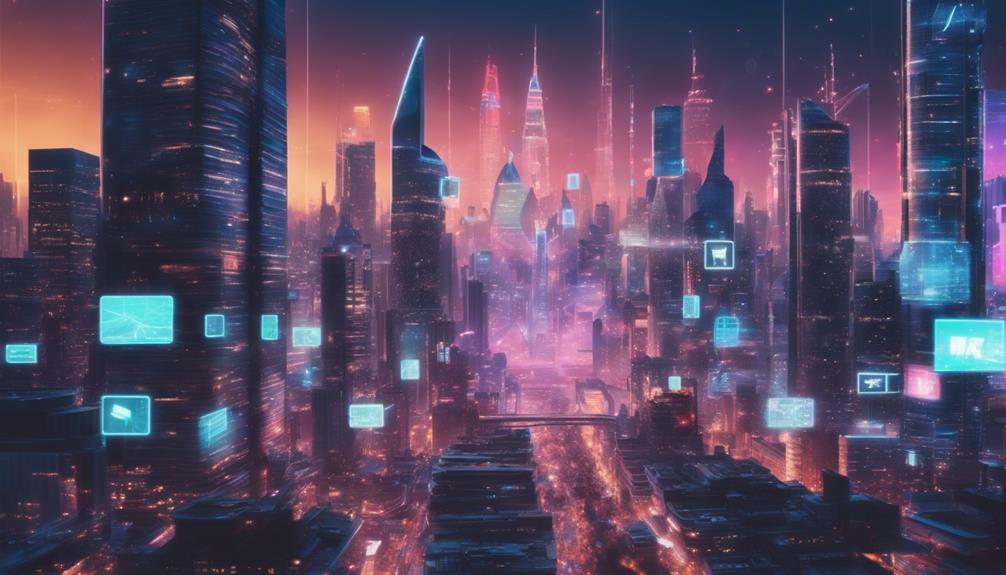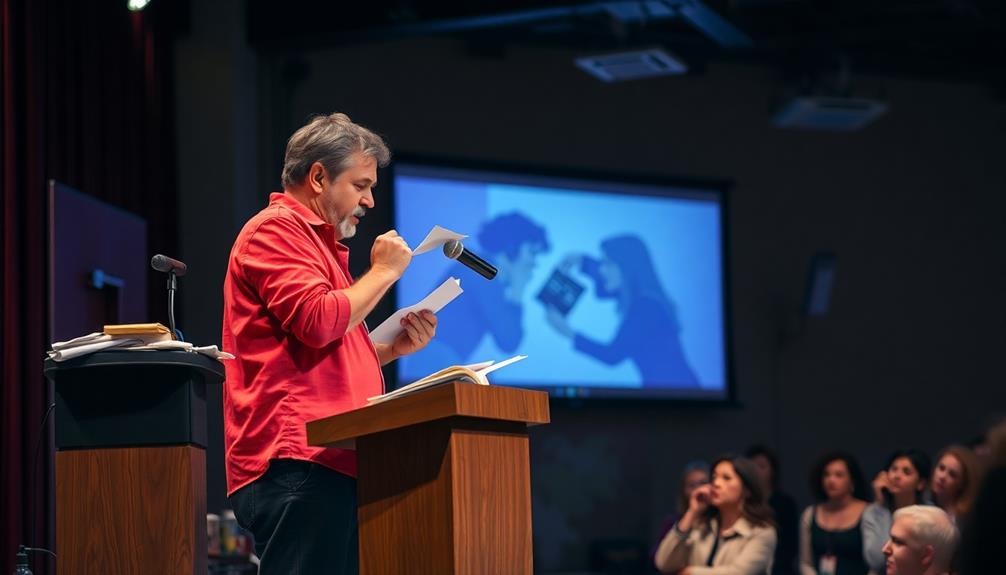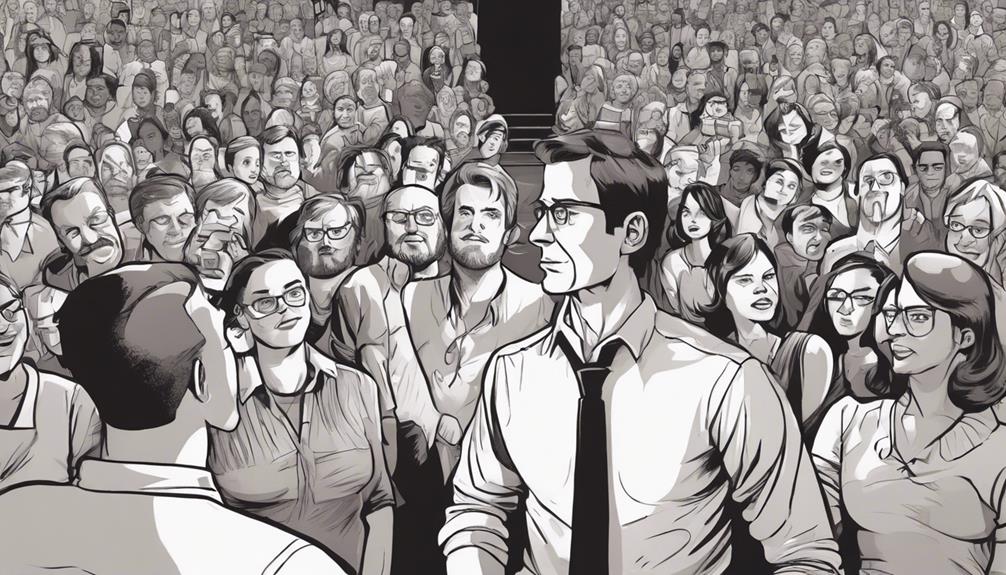You're likely aware that your social media habits are taking a toll on your mental health, relationships, and sense of reality, but the true extent of the damage may surprise you. From the isolation epidemic and fake news to cyberbullying, anxiety, and loneliness, social media's dark underbelly is affecting you more than you think. You're sacrificing meaningful connections for superficial validation, losing touch with reality, and fueling anxiety and depression. It's time to recognize the shocking truth and take control of your online presence. As you continue on this path, you'll uncover the secrets social media doesn't want you to know.
Key Takeaways
- Excessive social media use is directly correlated with deteriorating mental health, increased anxiety, depression, and loneliness.
- Highlight reels on social media create unrealistic expectations, leading to feelings of inadequacy, low self-esteem, and decreased self-worth.
- Cyberbullying, online harassment, and fake news spread rapidly on social media, causing harm to individuals and society as a whole.
- Over-reliance on social media leads to the erosion of deep conversations, meaningful connections, and genuine human experiences.
- Social media warps our sense of reality, fueling FOMO, anxiety, and dissatisfaction, making it difficult to distinguish between reality and curated perfection.
Social Media's Dark Underbelly Exposed
As you scroll through your social media feeds, you're likely unaware of the insidious forces at play, quietly eroding your mental well-being and relationships.
The first step to breaking free from this toxic cycle is acknowledging the harm it can cause. Social media platforms are designed to be addictive, and excessive use has been linked to increased rates of anxiety, depression, and loneliness.
The constant comparison to curated, idealized versions of others' lives can lead to feelings of inadequacy, and cyberbullying has become a prevalent issue, with harmful effects on mental well-being and self-esteem.
It's essential to recognize the dark underbelly of social media and take control of your online interactions. Start by being mindful of your screen time and taking regular breaks from social media.
Limit your exposure to toxic content, and unfollow or block accounts that make you feel bad about yourself. Remember, it's okay to take a step back and prioritize your mental health.
The Isolation Epidemic Spreads Fast

As you scroll through your social media feeds, you can't help but feel like you're surrounded by friends, but somehow, you still feel utterly alone.
You're not imagining things – the constant stream of curated highlight reels and witty one-liners can actually exacerbate feelings of loneliness, making you wonder if you're truly connected to others.
It's time to explore how social media's isolating effects are impacting your life, and what you can do to break free from the cycle of loneliness.
Lonely in the Crowd
You're surrounded by virtual friends, yet you can't shake the feeling of emptiness, a phenomenon that's becoming increasingly common in today's digitally driven society. It's as if the more you're connected online, the more disconnected you feel in real life.
Research suggests that heavy social media use is linked to feelings of loneliness and isolation, despite the apparent connectivity it offers. This is because the constant comparison to idealized online personas can lead individuals to feel inadequate and disconnected from real-life relationships.
Here are some alarming facts:
- Heavy social media use is linked to feelings of loneliness and isolation
- The constant comparison to idealized online personas can lead individuals to feel inadequate
- Increased screen time is associated with higher levels of loneliness and decreased well-being
It's crucial to recognize that social media isn't a substitute for genuine human connections. It's time to take a step back, assess our online habits, and focus on nurturing meaningful relationships in our daily lives.
Fear of Missing Out
Social media's constant barrage of curated updates and notifications fuels your anxiety, making you wonder what you're missing out on, and that's exactly what the fear of missing out (FOMO) is all about. You're not alone in feeling this way; FOMO is a real psychological phenomenon that's exacerbated by social media.
Studies have shown that excessive social media use can contribute to increased levels of anxiety, depression, and loneliness. The constant comparison to others' seemingly perfect online lives can intensify feelings of isolation and disconnection from real-life relationships. You might find yourself scrolling through your feeds, feeling like everyone else is having more fun, achieving more, and living a more exciting life than you are.
But here's the thing: it's all curated, and it's not real. To break free from the FOMO cycle, consider setting boundaries with social media, practicing mindfulness, and prioritizing meaningful offline connections. By doing so, you can start to address the negative impact of FOMO on your mental health and start building a more authentic, connected life.
Virtual but Not Connected
Frequently, you find yourself surrounded by virtual friends, yet somehow still feeling utterly alone, a phenomenon that has become all too common in today's digitally driven world. You're not alone in this feeling. Studies have shown that excessive social media use can lead to increased feelings of isolation and loneliness. Despite being constantly connected, you may feel disconnected from meaningful relationships.
Here are some disturbing facts about social media and isolation:
- Social media platforms can create the illusion of connection while promoting isolation.
- Excessive time spent on social media can lead to decreased face-to-face interactions, contributing to feelings of isolation.
- The constant comparison and validation-seeking on social media can exacerbate feelings of loneliness and disconnection.
It's essential to recognize the impact of social media on your mental health and take steps to maintain a healthy balance between your online and offline life. By being aware of these potential pitfalls, you can take control of your social media use and nurture meaningful relationships that bring joy and fulfillment to your life.
Fake News and Misinformation

As you scroll through your social media feeds, you're likely to come across false information that's spreading like wildfire, often from unverified sources.
You might unknowingly share or believe misinformation, contributing to the chaos.
It's essential to be aware of these risks, and to learn how to identify and combat fake news, so you can make informed decisions and help mitigate the harm it causes.
Spreading False Information
You're likely to believe a false claim on social media, given that fake news spreads six times faster than real news. This alarming reality highlights the significant impact of social media on the spread of misinformation.
As you scroll through your feeds, you're constantly being bombarded with information, and it's easy to get caught up in the chaos. However, it's essential to be vigilant and critical of the information you consume online.
Here are some startling facts about the spread of false information on social media:
- Fake news stories are 70% more likely to be retweeted than true ones.
- Misinformation can influence public opinion and decision-making, leading to harmful consequences in society.
- Social media algorithms often prioritize sensational or controversial content over accurate information, making it even harder to distinguish fact from fiction.
As you navigate the complex world of social media, remember that fact-checking websites are your allies in the fight against misinformation. Take the time to verify the sources of the information you come across, and don't be afraid to question what you read online.
Unverified Sources
When you mindlessly share unverified information on social media, you inadvertently contribute to the proliferation of fake news and misinformation. This can have devastating consequences, spreading false information that can lead to confusion, panic, and even harm.
| Consequences of Unverified Sources | Effects on Society | Your Role |
|---|---|---|
| Fake news spreads 6x faster | Misinformation and confusion | Verify sources before sharing |
| Lack of fact-checking | False beliefs and behaviors | Hold yourself accountable |
| Rapid sharing of falsehoods | Harmful consequences | Be cautious of unverified info |
Mental Health in Decline

Heavy social media users are increasingly vulnerable to anxiety, depression, and loneliness, with studies revealing a direct correlation between excessive online engagement and deteriorating mental health. You might think you're just scrolling through your feeds, but the constant barrage of curated perfection can take a toll on your self-esteem and mood.
Your social media use can affect your sleep quality, leading to fatigue and mood swings.
Comparing your life to others' highlight reels can lead to feelings of inadequacy and low self-worth.
The constant need for validation through likes and comments can create an unhealthy dependence on social media.
It's essential to recognize the impact of social media on your mental health and take steps to mitigate it. By being more mindful of your online activities and setting boundaries, you can reduce the negative effects and cultivate a healthier relationship with social media.
Cyberbullying and Online Harassment

Cyberbullying and online harassment have become pervasive problems, with over half of teenagers experiencing some form of online abuse, which can have devastating effects on their mental health and well-being. You might be wondering, what exactly does online harassment entail? Let's break it down:
| Form of Harassment | Description |
|---|---|
| Spreading Rumors | Sharing false information about someone online |
| Threatening Messages | Sending intimidating or harmful messages |
| Exclusion | Purposely leaving someone out of online activities |
| Physical Harassment | Sharing intimate or explicit content without consent |
As you can see, online harassment can take many forms, and it's vital to recognize the signs. If you're a victim of cyberbullying, know that you're not alone, and it's not your fault. It's important to remember that social media platforms have a responsibility to prevent harassment, and you have the right to report any incidents. Don't hesitate to reach out to a trusted adult or authority figure for support. Remember, you deserve to feel safe and respected online.
The Death of Deep Conversations

Frequently, you find yourself scrolling mindlessly through your social media feeds, sacrificing precious time that could be spent engaging in meaningful, in-depth conversations with others. With the constant stream of updates and notifications, it's easy to get caught up in the superficial world of social media, where quick likes and comments replace thoughtful discussions. But what's the cost of this mindless scrolling? The death of deep conversations.
- You're sacrificing meaningful connections for superficial validation.
- Your attention span is decreasing, making it harder to engage in thoughtful discussions.
- You're losing the ability to communicate effectively, relying on quick, surface-level interactions.
Research shows that excessive social media use can negatively impact your attention span and cognitive abilities, making it harder to sustain deep conversations. Social media's focus on instant gratification and superficial connections is diminishing the value of meaningful communication in society.
It's time to take a step back, put down your phone, and engage in conversations that matter. Your relationships, and your mental health, depend on it.
Social Comparison and Anxiety

As you scroll through your social media feeds, don't you wonder how others seem to have it all together, while you're left feeling like you're falling behind? It's no secret that social media platforms showcase the highlight reels of others' lives, making it easy to compare and feel inadequate.
Research confirms that excessive social media use is linked to increased feelings of social comparison and anxiety. The constant stream of curated and idealized representations of others' lives can make you feel like you're not measuring up.
But here's the thing: those seemingly perfect lives are often just that – seemingly perfect. People only share their best moments, hiding their struggles and imperfections from the online world. The pressure to maintain a certain image online can intensify feelings of insecurity and fuel a cycle of comparison and negative self-evaluation.
It's time to take a step back and remember that social media is only a glimpse into others' lives. Your worth and value extend far beyond your online presence.
Losing Touch With Reality

Spending an average of 2 hours and 24 minutes per day on social media platforms, you're likely to develop a warped sense of reality, where curated content and manipulated images replace genuine human experiences and relationships.
As you scroll through your feeds, it's easy to get caught up in the highlight reels of others, forgetting that nobody posts about their mundane daily routines or struggles.
You start to believe that everyone else's life is more exciting, successful, or fulfilling than yours. You begin to compare your behind-the-scenes moments to others' edited and staged photoshoots. You feel like you're missing out on the fun, and that FOMO (Fear of Missing Out) sets in, making you feel anxious and dissatisfied with your own life.
Frequently Asked Questions
Why Social Media Is Damaging Society?
You're likely wondering why social media is damaging society, and the answer lies in its impact on your mental health, relationships, and interactions. Excessive use isolates you, fuels anxiety, and diminishes face-to-face connections, ultimately harming your well-being.
How Social Media Is Ruining Us?
You're constantly comparing your life to others on social media, feeling lonely and isolated, and struggling with self-doubt, all while sacrificing real-life connections and meaningful interactions for fleeting online validation.
Why Is Social Media Toxic?
You wonder why social media is toxic, but let's face it, you're already aware of the constant stream of unrealistic images and curated lifestyles that make you feel inadequate and anxious – it's time to acknowledge the harm.
How Is Social Media Affecting Us?
You're likely feeling lonely and isolated, anxious or depressed, and struggling with low self-esteem due to constant comparisons on social media, which is also affecting your productivity and exposing you to online harassment.
What Evidence Supports the Claim that Social Media Is Ruining Society?
The ongoing social media impact on society debate has brought to light numerous pieces of evidence that support the claim that social media is ruining society. From increased rates of anxiety and depression to the spread of misinformation and division, there are many detrimental effects that have sparked concern among experts and the general public alike.
Conclusion
As you scroll through your feeds, remember that social media is merely a virtual mirror, reflecting a distorted version of reality. Like the ancient Greek myth of Narcissus, we're mesmerized by our own reflections, forgetting to look up and engage with the world around us.
It's time to shatter the glass and reconnect with humanity. Limit your screen time, engage in meaningful conversations, and prioritize self-reflection. Your mental health, relationships, and society depend on it.









